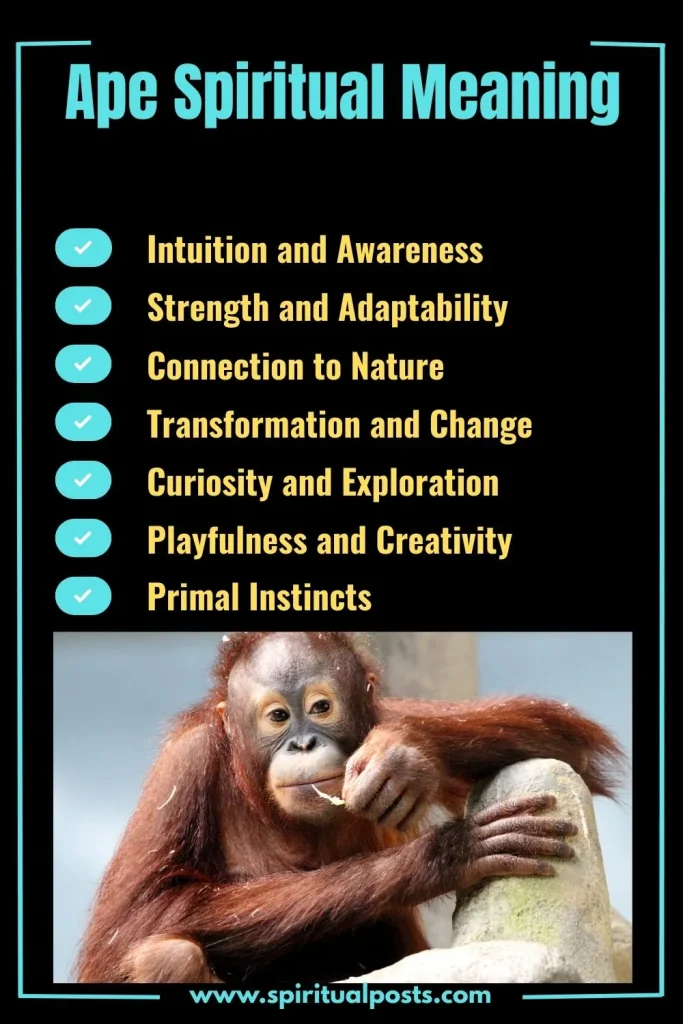The Spiritual Meanings of Ape and Its Symbolism

Apes are large primates that don’t have tails. They stand out because they are incredibly smart and share many traits with humans. Scientists divide them into two groups—great apes, like gorillas, chimpanzees, bonobos, and orangutans, and lesser apes, like gibbons and siamangs.
These animals are known for their brainpower. Some of them can use tools, solve puzzles, and even learn basic signs or gestures to communicate. This shows that their intelligence is not only real but also deeply impressive.
Their social lives are just as interesting. Apes often live in tight family groups where they take care of each other, solve problems together, and share food. They even show emotions like happiness, sadness, or anger.
Because they look so much like us—especially in their faces and the way they move—people have always been fascinated by them. This close connection has helped shape the spiritual and cultural meanings we attach to apes.
As we keep learning about apes, we start to see them as more than animals. They become symbols that help people explore deep questions about life, change, and our connection to nature.

Key Takeaways
- Apes symbolize the connection to the natural world, representing a primal wisdom and intuitive understanding of the cycles and rhythms of the earth.
- Ape symbolism often reflects the duality between the physical, instinctual aspects of human nature and the spiritual, enlightened aspects.
- Ape’s adaptability and capacity for transformation are seen as metaphors for personal growth, renewal, and the willingness to embrace change.
- Ape’s boundless curiosity and spirit of exploration are viewed as reminders of the power of curiosity to drive personal transformation and spiritual discovery.
What Does It Mean When You See an Ape?
Seeing an ape might feel exciting or even a little strange. That’s because many people believe apes carry strong messages. In many traditions, an ape sighting means something important is going on in your life or within yourself.
Apes are often linked to wisdom. Because they are smart and good at solving problems, spotting one might mean it’s time to trust your brain more. It can be a sign to think carefully and rely on your experience.
They also stand for adaptability. Apes live in different kinds of forests and figure out ways to survive. If one appears to you, it might be telling you to stay flexible and be ready for changes that could come your way.
Apes remind us of our connection to nature. Seeing one might make you feel more aware of your own roots in the natural world. This can help you feel more grounded or even more grateful for life around you.
Another powerful meaning is transformation. Because apes seem to move between the wild and the wise, they can stand for a big shift in your life—maybe in how you think, what you believe, or where you’re headed.
Lastly, apes show us duality. They act on instincts but also show deep thought. Seeing an ape can be a reminder to balance your wild side with your thoughtful side, helping you grow into a more complete person.
Ape Symbolism
In many cultures, apes mean more than what you see at first glance. They’ve become powerful symbols that reflect the way humans think, feel, and grow. Some people see them as strong and wise, while others see them as wild and unpredictable.
Apes have always amazed people with their cleverness. That’s why they are often symbols of intelligence and creativity. In stories, they might be the smart helper or the one who solves the big problem, showing how thinking outside the box can save the day.
In spiritual traditions, apes sometimes stand for transformation. Because they seem to sit between the human and the animal worlds, they represent change—not only in your outside world but also deep inside yourself.
Apes can also mean life and growth. Some people believe they are linked to fertility or birth, because of their energy and connection to natural instincts. They remind us of our basic human needs and desires.
But apes don’t always carry happy meanings. In some stories, they’re seen as tricksters or symbols of greed. They might represent the darker sides of ourselves—the parts we hide or don’t want to face. That makes them complex and interesting symbols, showing both the light and shadow within us.
7 Spiritual Meanings of Ape
As you explore the spiritual meanings of the ape, you’ll discover that this remarkable creature embodies a powerful symbol of intuition and awareness.
The ape’s remarkable strength and adaptability represent the ability to navigate life’s challenges with grace, while its deep connection to nature reminds us of our own innate ties to the world around us.
From transformation and change to curiosity and exploration, the ape’s spiritual significance offers valuable insights for those seeking to deepen their understanding of the natural world.
1. Intuition and Awareness
The ape is known for its strong sense of intuition and awareness, which plays a big role in how it moves through life. These animals are always paying attention, noticing small changes in their surroundings that many others would miss. This sharp awareness allows them to stay safe and find what they need to survive.
Apes use their keen senses not only to find food or detect danger but also to understand the emotions and intentions of others. Their ability to read body language and facial expressions is truly impressive. This helps them communicate and live peacefully in their groups.
This natural awareness reminds us to be more in tune with the world around us. Whether it’s noticing how someone is feeling or being alert to small changes in our environment, these small acts of awareness can make a big difference.
By learning from the ape’s behavior, we can develop our own intuition and become more connected to the world we live in. Being aware doesn’t take a lot of effort—it starts by paying attention and staying open to what’s happening around us.
2. Strength and Adaptability
Apes are incredibly strong, and that strength isn’t only physical—it’s also emotional and mental. They can lift, carry, and move things much heavier than their own body weight. But what’s even more amazing is how they can change and adjust depending on the situation.
They swing from tree to tree with ease, but they can also walk, climb, and problem-solve in ways that show great adaptability. Whether they’re in thick forests or rocky hills, apes find ways to survive and thrive. That’s something many people admire.
This mix of strength and flexibility is a valuable lesson. Life doesn’t always go as planned, and being able to shift direction while staying strong is a skill worth having. The ape shows that it’s possible to be both powerful and adaptable.
From their strong arms to their smart minds, apes remind us that we can face challenges with courage and adjust our path when needed. It’s a great example of what true resilience looks like.
3. Connection to Nature
The ape shares a deep bond with nature that can be seen in how it moves, eats, and interacts with the world. These animals seem to know the natural rhythms of the Earth, as if they are part of something bigger. Watching them in their environment feels like watching a dance between animal and forest.
They don’t fight the natural world—they move with it. Every step, swing, or rest is in sync with the land around them. This connection shows us what it means to live in balance, something many people have lost in today’s busy world.
Apes live by listening to the signs of nature. They notice when the seasons shift, when food is ready, or when danger is close. These small but powerful instincts help them survive and keep harmony with their surroundings.
Their bond with nature is not about controlling it—it’s about respecting it. This is a message that many of us can learn from. Reconnecting with the Earth can help us feel more at peace, just like the ape.
4. Transformation and Change
The ape doesn’t stay the same throughout its life—it grows, learns, and changes, which makes it a strong symbol of transformation. From baby ape to adult, their journey is filled with learning and adapting to new things. This mirrors the way people change as they go through life.
Apes adjust how they act depending on where they are or who they’re with. They might play one moment and defend themselves the next. These quick changes show that being flexible is part of growing. It teaches us that change is not something to fear.
This kind of change isn’t just on the outside. It also happens in how apes think and behave. They solve problems, remember paths, and work together. That kind of mental and emotional growth is important in the spiritual sense too.
When we look at the ape, we’re reminded that life is full of moments where we grow. Each challenge we face is a chance to learn something new or shift how we see things. Transformation isn’t always easy, but it’s often where real growth begins.
5. Curiosity and Exploration
Apes are known for being incredibly curious. They touch, taste, and explore anything new in their space. This need to discover shows how natural it is to want to learn and understand. Their curiosity isn’t random—it helps them survive and thrive.
Whether it’s figuring out how to open something or testing out a new path, apes are always eager to explore. They don’t sit still when there’s something new to figure out. This shows us that curiosity can be a powerful tool in life.
Their love for learning doesn’t go away with age. Even older apes continue to watch, listen, and try new things. This shows that learning never has to stop, no matter how old we get.
By observing apes, we can remember how valuable it is to stay open-minded and willing to explore. Curiosity keeps life interesting and helps us grow in ways we might never expect.
6. Playfulness and Creativity
Apes aren’t always serious—they love to play. Whether they’re chasing each other, making sounds, or using objects in clever ways, apes show a lot of creativity in how they interact. This playful energy is more than fun—it helps them learn and connect with others.
Through play, they practice skills they’ll need later in life. Swinging, jumping, and mimicking each other all help them grow stronger and smarter. But more importantly, it builds trust and connection within their group.
Their creativity shows up in how they use tools, solve problems, and communicate. It’s amazing to see how they figure out new ways to reach their goals. That kind of thinking is something we can learn from.
Sometimes, taking a break from stress and allowing ourselves to enjoy life makes everything feel lighter. The ape’s playful nature is a great reminder that joy and creativity are important parts of any journey.
7. Primal Instincts
Deep down, apes are guided by something ancient—their primal instincts. These are the natural reactions and behaviors they’re born with, like knowing when to run, when to fight, or when to care for others. These instincts keep them safe and connected to the natural world.
They don’t second-guess their actions. When they feel something, they trust it. This kind of trust in one’s own feelings is something many people lose as they grow up. Watching apes reminds us that some of the most powerful guidance comes from within.
They listen to their bodies. If they’re hungry, tired, or alert to danger, they respond without delay. These responses are built from thousands of years of survival. They teach us the value of listening to what our bodies are trying to tell us.
By reconnecting with our own instinctive side, we can feel more in control of our emotions and actions. It’s not about going back to the wild—it’s about remembering that we have natural wisdom inside us, waiting to be noticed.
Ape Symbolism in Different Cultures and Contexts
Apes hold special meanings in many cultures around the world. In Native American traditions, apes are seen as sacred creatures connected to the spirit world. In Celtic stories, they symbolize strength and energy, often linked to nature’s wild side.
In Nordic myths and African folklore, apes are deeply tied to human spirituality and natural forces. They appear as symbols of mystery, power, or even trickery, depending on the culture. Eastern philosophies also see apes differently—sometimes as signs of change and growth.
These examples show how humans have long connected with apes in symbolic ways. Each culture highlights different traits of apes, reflecting how people understand life and nature.
Native American Culture
In many Native American cultures, apes carry strong spiritual meanings. They are often seen as messengers between the human world and the spiritual realm. This makes them important figures in stories and traditions.
Apes are sometimes thought of as tricksters, showing the complicated sides of human nature—both clever and mischievous. They also represent the deep connection between all living things, acting as guardians of the forest.
Many tribes believe apes help keep balance in nature and protect their communities. This respect shows how closely people felt connected to animals and the land.
By learning about these views, we can better appreciate how apes fit into Native American spirituality and culture.
Celtic Culture
In Celtic myths, apes are linked to mischief and the unpredictable forces of nature. They were believed to move between the physical world and the spiritual one, making them symbols of change and mystery.
Celtic shamans and druids would call on the ape’s energy during rituals. They admired apes for their adaptability and sharp senses, thinking these traits helped connect with hidden spiritual truths.
Art from this culture often shows apes alongside other strong animal symbols like wolves and ravens. This highlights their role as guides between worlds.
The ape’s symbolism in Celtic culture points to a respect for nature’s wild and mysterious power.
Nordic Culture
The Nordic view of apes is quite different. Instead of revering them, Norse stories often show apes as symbols of chaos and trickery. They represent wild, uncontrolled forces that can disrupt order.
Apes in these myths are linked to cunning and deceit, warning people about dangerous impulses. They share traits with figures like Loki, the god of mischief, who stirs trouble among gods and humans.
This negative view reflects how Norse people valued control and stability. Apes, as symbols of wildness, remind them of the risks of letting chaos take over.
Their stories show a struggle between order and the untamed parts of nature and human nature.
African Culture
In many African cultures, apes are seen in a positive light, symbolizing wisdom, strength, and spiritual power. From ancient Egypt to various African tribes, apes were often respected as intelligent beings connected to the divine.
They represent knowledge and the ability to understand deep mysteries. Their physical strength makes them symbols of vitality and protection. Many believed apes could bring good luck and guard against evil.
Apes are also admired for their adaptability, showing how change is part of life and the spirit world. This respect highlights their important place in African beliefs.
Eastern Culture
In Eastern traditions, apes carry more complex meanings. In Hinduism, the monkey god Hanuman is famous for strength, loyalty, and wisdom. He represents the power to overcome difficulties and stay devoted.
In Buddhism, apes sometimes symbolize the restless mind. They remind people of the challenge to calm their thoughts and reach inner peace.
Apes in these cultures show the mix of human flaws and higher potential. They point to growth, discipline, and spiritual progress.
These meanings show how apes can reflect both the animal side and the divine side of humans.
Hindu Culture
Hindu stories feature several important ape gods. Hanuman stands out as a symbol of courage, devotion, and cleverness. His stories teach about faith and persistence in tough times.
Other ape figures like Vali and Sugriva tell stories about loyalty, pride, and community strength. These tales offer lessons on how to live well and act righteously.
These ape gods are more than myths—they represent human qualities and spiritual paths. They remind people to be brave, humble, and faithful.
Arts and Literature
Apes appear in many artistic and literary traditions beyond India. In Western stories, they sometimes show the wild, untamed parts of humans. But apes can also be wise and clever figures.
Hanuman, from the Ramayana, has inspired art and books worldwide. Apes in stories often represent trickery, the balance between wildness and wisdom, and connections to higher powers.
Artists use apes to explore human nature’s different sides. They help tell stories about how people struggle with their instincts and reason.
Mythology
Apes hold important roles in myths all over the world. In African tales, they are tricksters—clever and sneaky. In Japan, monkeys are sacred messengers with special powers.
Hindu mythology shows apes as smart and sometimes mischievous gods. Mayan stories link apes to gods of the underworld and time. Ancient Greeks saw apes as symbols of the mixed nature of humans.
Across cultures, apes stand for many ideas—sometimes wise, sometimes wild, sometimes spiritual. This shows how deeply humans relate to these animals.
Ape Biblical Meanings
The Bible does not mention apes directly. However, some scholars think references to “wild beasts” or “creatures of the forest” might include apes.
Apes can represent human nature’s two sides—the smart, thoughtful part and the impulsive, wild side. They remind people of the importance of caring for all creatures, part of God’s creation.
Seeing apes as part of the natural world helps us understand our role in protecting and respecting life around us.
Spiritual Meaning of Dream About Ape
Dreams about apes can be powerful. They might reflect the different sides of your personality—your animal instincts and your higher thoughts living together.
Such dreams could mean you need to pay attention to your gut feelings or balance your emotions with logic. They may also show a desire to connect more with nature or to be curious and adaptable.
The ape’s behavior in the dream gives clues about what your spirit is trying to tell you. How you feel in the dream matters, offering deeper insights into your growth.
Ape Spirit Animal, Totem, and Power Animal
As a spirit animal, the ape asks you to be flexible, curious, and connected with nature. It urges balance between your feelings and thoughts, between wildness and wisdom.
As a totem, the ape stands for cleverness, problem-solving, and strong social bonds. It reminds you that working with others is important.
As a power animal, the ape gives you sharper observation skills, confidence, and the courage to try new things.
Final Thoughts
Apes carry deep meanings tied to nature and humanity. They teach lessons about change, curiosity, and balance between instincts and intelligence. Across many cultures, they symbolize strength, wisdom, and connection to the spirit world. These rich meanings invite us to see apes as guides to understanding the rhythms of life and our place within it.
You Might Also Like
1) Flounder Spiritual Meanings and Symbolism
2) Black Bird Spiritual Meanings and Symbolism
3) Beetle Spiritual Meanings and Symbolism
4) Warbler Spiritual Meanings and Symbolism
5) Emu Spiritual Meanings and Symbolism





